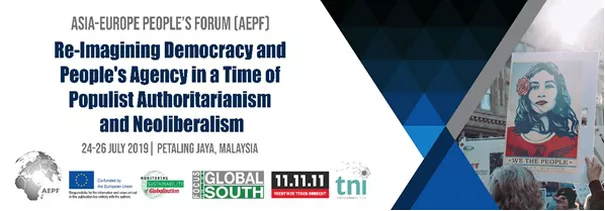Statement from interface between Asian and European Parliamentarians and civil society representatives in Petaling Jaya (Malaysia) on 24th July 2019

Petaling Jaya (Malaysia) Declaration
In this interface between Asian and European Parliamentarians and civil society representatives we declare the following:
Even while about 53% of people globally live under authoritarian regimes, democracy in many countries of Asia and Europe is being weakened. Several governments in collaboration with big corporations are using authoritarian methods to control institutions and curb people’s rights.
We the MPs from seven countries and civil society members from over 20 countries be-lieve in people centered democracy. Participatory democracies have the capacity to pro-vide sustainable development, provide welfare and lift people out of poverty. However with neoliberal globalization, the dominance of oligarchs, trans-national corporations, military industrial complexes and foreign capital has increased. These have disproportionate influence on social, economic, political and cultural policies. This trend is detrimental to democratic processes.
All our societies are diverse and plural in nature. But, religious fundamentalism marked by chauvinist identity politics, exclusive nationalism and selective violence is being used to curb all relevant forms of dissent and target rights.
There are ongoing crimes against humanity which are being normalised. (For example, the genocide of the Rohingya community in Myanmar and the siege on refugees in the Mediterranean). Migrants and refugees are being criminalized. People and organisations who express solidarity with victims of oppression are harassed in multiple ways.
People have lost trust in the system as they believe that democracy has not delivered basic needs. People, especially the youth are therefore turning to right wing movements. Decades of neo-liberal globalisation has increased inequality and about 1.5 billion people are malnourished while basic needs ( education, health social security, etc) are unmet. There is continuous devastation of the global environment, including climate change and loss of bio diversity. This anxiety is leading to a rise in hate speech against the ‘other’.
We Parliamentarians and civil society movements are committed to reclaim democracy and humane politics for people and make some recommendations:
Governments at all levels must become more transparent and accountable to people, and new forms of decentralisation of power and right to information should be institutionalised.
We commit to enhance our struggle against neoliberalism and corporate power. This is because the rise of big finance capital goes against the welfare of people and social jus-tice. It leads to varieties of corrupt power.
We support universal and quality social protection and call for an end to commercialisation in social sectors like education, health, water and energy. We support solidarity economies. For example, community and collective control over local resources, public-public partnerships, re-municipalisation, etc.
Young people have lost faith in the system. We should encourage their participation in progressive movements and in activities they wish to be part of without fear. The monopoly and use of social media by corporations and right wing forces is challenging social relations and democracy. We call for greater norms to prevent hate speech, fake news, trolling, etc.
We have decided to take initiatives to support in the UN the proposed Binding Treaty on Corporations, that makes corporates more accountable.
We call upon Governments to sign, ratify and implement the (1990) Convention on mi-grants and their families and withdraw threats against so-called refugees, many of whom are citizens.
Many of our fellow Parliamentarians have been jailed because of political vendetta. We call for a release of all political prisoners.
We recommend that Parliamentarians and public policy makers engage with civil society in a continuous and accountable way. We believe that governments have the responsibility to make democracy accessible by putting people in the center of policy making and implementation.
Charles Santiago (Chairperson of ASEAN Parliamentarians for Human Rights (APHR); MP, Malaysia); Mercy Chriesty Barends (MP, Indonesia); Deepak Bhatt (MP, Nepal); Tian Chua (Former MP, Malaysia); Aida Kasymalieva (Vice Speaker, MP, Kyrgyzstan); Hassan Murtaza (Member of the Punjab Assembly of Pakistan); Eulàlia Reguant (Former MP, Cat-alonia); Mylvaganam Thilakarajah (MP, Sri Lanka)
Resource Persons from Civil Society: Tur-Od Lkhagvajav (Mongolia); Tina Ebro (Philip-pines); Dr. Geo-Sung Kim (South Korea); Brid Brennan (Ireland and Holland); Kamal Mitra Chenoy (India); Farooq Tariq (Pakistan); Achin Vanaik (India).



